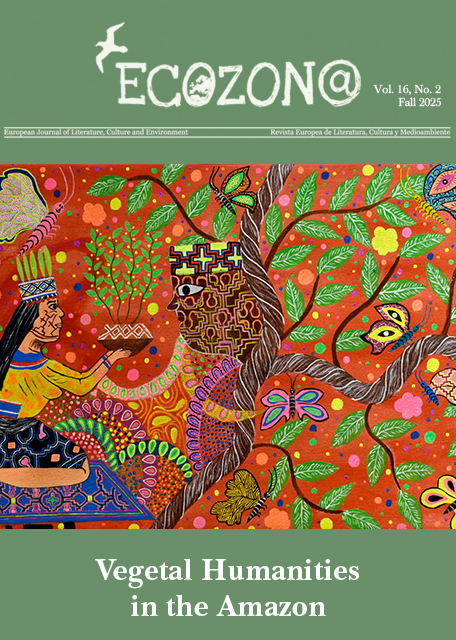<b>POÈME : la POïesis à l’Ère de la MÉtamorphose</b> // POÈME: La POiesis en la Era de la MEtamorfosis
DOI:
https://doi.org/10.37536/ECOZONA.2019.10.1.2649Parole chiave:
Poïesis, poétique, écopoétique, architecture et design // Poïesis, poetics, ecopoetics, architecture and design // Poiesis, poética, ecopoética, arquitectura y diseñoAbstract
Résumé
En nous appuyant sur une reconstitution de l’histoire de la notion de poïesis et notamment sur ses mobilisations dans des domaines extra-littéraires, nous dégageons dans cet article son potentiel pour être réinvestie comme désignant un certain type de faire ouvert au hasard et au vivant, se déployant aussi bien dans le medium naturel que dans le medium de la langue. Nous proposons alors de re-sonder à l’aune de son instrument une série de lieux de vie autonomes étudiés pendant une enquête terrain de quatre mois, de mai à septembre 2015. Comme nous le montrerons, la poïesis s’avère particulièrement utile pour observer dans ces habitats au métabolisme réinscrit dans la nature vivante des productions faisant figures de véritables « nexus » ou enchevêtrements entre matière et signification. Ceux-ci donnent corps à une « habitation poétique du monde » observable non plus dans les textes mais au cœur de la vie quotidienne, appelant en filigrane à élargir le domaine de l’écocritique et à se ressaisir de sa dimension profondément politique.
Abstract
This article starts with a survey reconstructing the history of the notion of poiesis, with a specific emphasis on the way it has been used in various fields outside literature. This survey brings out that the potential of poiesis to be both understood and dwelled in anew as a type of making open to randomness and that organically unfurls together with the unpredictability of the living, as well as a kind of fashioning that unfolds equally in natural processes and those of human language. In this very light, the article then goes on to probe into the poiesis characterizing a series of sustainable alternative dwellings which were studied over a four-month period of fieldwork, from May to September 2015. Within those human habitats organically built up and encapsulated again within living nature, poiesis proves particularly useful when examining the production of designs and artefacts which entangle matter and meaning in a genuine ?nexus.” Such designs and artefacts, it is argued here, give physical shape to a ?poetic inhabiting of the world” no longer limited to literary texts only, but also unfolding at the very heart of everyday life. In connection with these sustainable forms of human habitat, and even beyond, this article sheds new light on the very embodied, and therefore political, nature of language and the imagination.
Resumen
Este artículo comienza con una estudio que reconstruye la historia de la noción de poiesis, con un énfasis específico en la forma en que esta se ha utilizado en diversos campos ajenos a la literatura. Este estudio revela que el potencial de la poiesis debe ser entendido y reinstaurado como un modo de « hacer » abierto al azar y que se despliega orgánicamente junto con la imprevisibilidad de la vida, así como un modo de diseño que se desarrolla igualmente en procesos naturales y del lenguaje humano. En este mismo sentido, el artículo continúa investigando la poiesis que caracteriza una serie de viviendas ecológicas alternativas y sostenibles que se estudiaron durante un período de cuatro meses de trabajo de campo, de mayo a septiembre de 2015. Dentro de esos hábitats humanos construidos orgánicamente y encapsulados nuevamente dentro de la naturaleza viva, la poiesis es especialmente útil al examinar la producción de diseños y artefactos que entremezclan la materia y el significado en un « nexo » genuino. Tales diseños y artefactos, se argumenta aquí, dan forma física a un « vivencia poética del mundo » que ya no se limita a los textos literarios, sino que también se desarrolla en el corazón de la vida cotidiana. En relación a las formas sostenibles de hábitat humano y no-humano, este artículo arroja nueva luz sobre la naturaleza, encarnación, y por lo tanto idioma político, del lenguaje y la imaginación.
Downloads
##submission.downloads##
Pubblicato
Fascicolo
Sezione
Licenza
Authors who publish with this journal agree to the following terms:
a) Authors retain copyright and grant the journal right of first publication with the work simultaneously licensed under a Creative Commons Attribution License that allows others to share the work with an acknowledgement of the work's authorship and initial publication in this journal (CC BY-NC for articles and CC BY-NC-ND for creative work, unless author requests otherwise.
b) Authors are able to enter into separate, additional contractual arrangements for the non-exclusive distribution of the journal's published version of the work (e.g., post it to an institutional repository or publish it in a book), with an acknowledgement of its initial publication in this journal.
c) Authors are permitted and encouraged to post their work online (e.g., in institutional repositories or on their website) prior to and during the submission process, as it can lead to productive exchanges, as well as earlier and greater citation of published work (See The Effect of Open Access).










